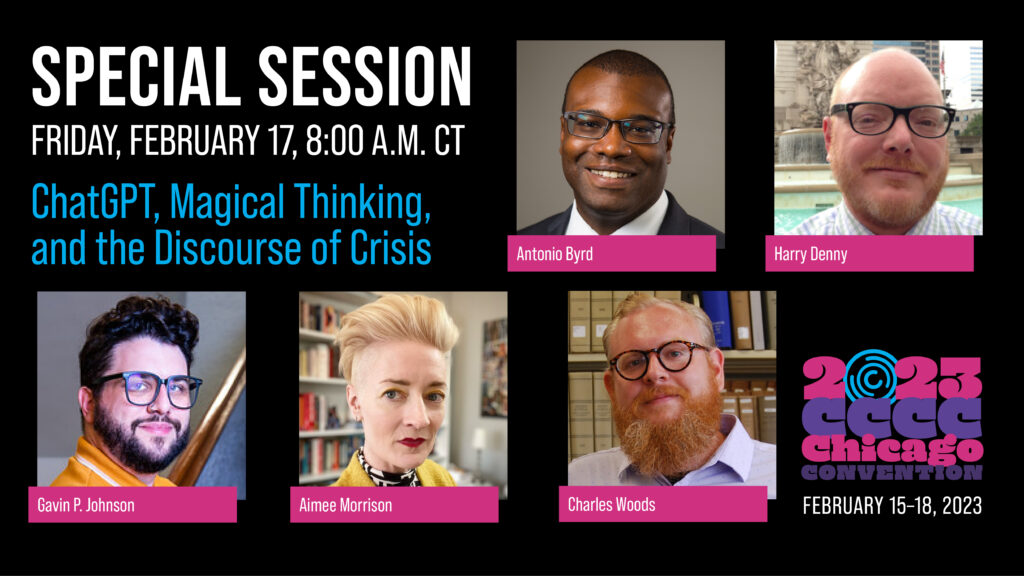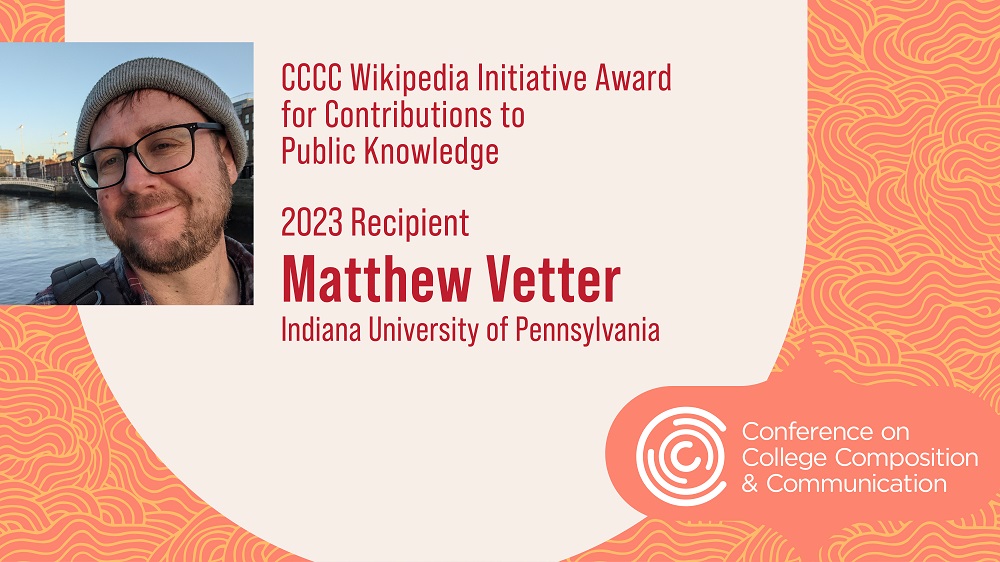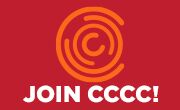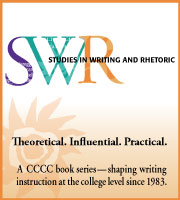Conference on College Composition and Communication
April 2023
Exigence and Purpose
Editorial work—including every stage in the process by which scholarly work is reviewed and guided toward publication in academic journals and edited collections—is an important area of research, and CCCC recognizes that it is vital to maintain only the highest standards of ethical behavior, integrity, and professionalism in our academic publications. However, as others have noted, the process by which academic work enters the scholarly conversation through publication is often invisible (Ianetta; Sparks; Giberson, Schoen, and Weisser), and editorial work is, thus, both an understudied and undertheorized area of our field. This lack of intentional engagement with the behind-the-scenes work of scholarly publishing, and the occlusion of our editorial and peer review practices, may challenge our field’s work toward social justice and halt our best efforts to engage more diverse, inclusive, and equitable publication practices. As Blewett et al. write:
Just as equality in the classroom doesn’t manifest simply because well-intentioned people want it to, incorporation of diverse perspectives, bodies, and knowledge-making approaches in scholarly conversations requires what we are calling inclusion activism. To be inclusion activists, editors must be aware of how power relations operate in a field, be willing to challenge operations that exclude and diminish the experience and knowledge of some while propping up that of others, and be supportive of those who have not traditionally had access to or representation within field conversations (cf. Ahmed, Living a Feminist Life). Inclusion activism is an intentional effort to ensure participation and access as well as leadership opportunities to people of all backgrounds, at all career stages (274).
As Blewett et al. also note, “If we want equitable representation in our scholarship and in our field at large, we have to create the conditions to make it happen” (274). With this statement, our task force acknowledges the need for editorial transparency, ethical practices, and professional guidelines to advance diversity, equity, and inclusion in our scholarly publication practices. We also believe that it is only through intentional measures to advance diversity, equity, and inclusion that our field may make space for new or underrepresented disciplinary perspectives, for transformative conversations, and for innovative research and practices.
The guidelines we offer below have been shaped the most by one resource in the field of writing studies that asserts the role editors, reviewers and authors can play in pushing back against institutional racism. That document, “Anti-Racist Scholarly Reviewing Practices: A Heuristic for Editors, Reviewers and Authors,” was created by scholars in the field of technical communication and argues powerfully for the need to recognize and resist when academic review processes “reinscribe racism.” This CCCC statement was inspired and informed by that heuristic and aims to be an extension of that work, but with a broader emphasis on the various ethical dilemmas that may emerge in scholarly publication given disparities in power due to multiple and often intersecting positionalities, including ethnicity, gender, ability/disability, class and sexuality, but also related to access to resources, theoretical and scholarly orientation, institutional affiliation, and location on an academic career trajectory.
Our goals, therefore, are as follows:
- To open up a conversation about the complicated ethical issues that often emerge in the process of soliciting work, reviewing contributions to journals and edited collections, providing feedback, and guiding authors toward publication.
- To provide a set of guidelines or suggestions for ways to encourage generative, empathetic, and productive relationships among all participants in the process of academic publication in journals and edited collections. We hope these guidelines can be used by authors as they advocate for a better experience while navigating the publication process; by reviewers as they perform their vital service evaluating and responding to manuscripts; and by editors, as they seek to guide reviewers and develop their own journal-specific guidelines.
A Note about the Process of Developing Guidelines
The guidelines that follow draw upon our own experiences as authors, editors, and reviewers but are also informed by the generous contributions of members of the scholarly community. In an attempt to hear other voices and learn about situations outside our own experiences, the authors of this statement invited authors and editors to share stories about their experiences with publication, both positive and negative. We observed, in reviewing the stories our colleagues shared, that they coalesced around the following categories:
- Transparency about time and timelines
- Mentoring and revision
- Publication decisions: gatekeeping and inclusivity
- Conflicts of interest
- Intellectual property and citation
- Journal management
- Naming and citation practices
We used these categories to organize our recommendations in order to highlight the different aspects of editorial work that need to be considered and to suggest that all participants in academic publishing have a role to play in fostering ethical editorial practices. Because individuals inhabit different roles at different times in their professional careers, sometimes simultaneously, it may be helpful to think of editorial ethics as a larger ecosystem with all participants contributing to the health and sustainability of that environment.
Guidelines and Recommendations
I. Transparency about time and timelines
- Editors should communicate publication time frames, letting authors know if a submission will be sent to reviewers and alerting authors to any delays in the process. Editors should give authors ample time to perform tasks, such as copyediting, and to address corrections speedily, letting authors know when they have done so.
- To the extent it is possible, editors should set and publish approximate timelines and turnaround times for each step in the review and publication process.
- Editors should make the decision over whether a piece can move on to the reviewer stage quickly and let the author(s) know whether the piece has moved to the next stage or whether it is not a good fit for the publication. If not a good fit for the publication, it is helpful whenever possible to suggest other publications that might be interested in the piece.
- Authors should recognize that editing requires considerable time spent in fielding questions from authors, identifying and securing reviewers for submissions, managing the peer review process, and bringing issues to press.
- Journals and editorial boards might choose to adopt policies to protect editors from harassment and excessive demands on their time, such as standardized language to communicate with authors who challenge editors’ judgments.
II. Mentoring and revision
- Editors should write memos to authors synthesizing reviewer feedback and clarifying which of the reviewers’ requests the editors would like to see implemented and which are optional. For instance, if a reviewer suggests a long list of secondary sources, editors might point to the most relevant ones. As the ones who know their publication most intimately, editors can explain how they would like to see the draft transformed, whether or not those issues were brought up by reviewers.
- Editors should invite authors to write a memo when they resubmit their piece and offer guidelines for authors to follow as they fulfill this request. These guidelines can ask authors to respond to the reviewers’ and editors’ suggestions, explaining which ones they took into account and how they did so. If authors decide not to make a suggested change, the rebuttal memo is the ideal place for them to explain why. Having the rebuttal memo as a guide allows editors and reviewers to have a clearer sense of the authors’ intentions and choices as they read the revision.
- Editors should consider offering face-to-face feedback to authors who may benefit from it. Through conversation, editors can help authors figure out what they want to say and how to say it. Although it may seem time consuming, this practice may end up saving time, as it prevents misunderstandings by allowing authors to ask questions (and editors to answer them) in real time instead of requiring back and forth emails.
- Journals should be transparent about their review processes—whether multiple “Revise and Resubmits” can be expected, whether formal mentoring is provided, whether the editors engage in developmental editing. When clearly stated in the submission guidelines, this allows authors to choose to send their work to the kinds of journals that engage in the practices that best suit their needs, timelines, and revision styles.
III. Publication decisions: gatekeeping and inclusivity
- Editors, editorial board members, reviewers, authors, and special issue editors should all agree to follow the “Anti-Racist Scholarly Reviewing Practices” heuristic. Review requests should include a link to this statement.
- Editors and reviewers should recognize the value of diverse language practices and linguistic choices within articles and other publications, as opposed to enacting linguistic racism by privileging “white linguistic and cultural norms” (Baker-Bell et al.).
- Editors and reviewers should recognize that these professional roles position them as gatekeepers who should be reflexive about what perspectives are included and excluded in our disciplinary publications. For example, if a submission initially seems jarring or too different from already established practices and ways of thinking, editors and reviewers should keep an open mind and consider what new directions such a submission might open for the field.
- Reviewers should make their comments in a respectful manner even if they strongly disagree with a submission, whether partially or in its entirety.
- Editors should create a brief training document to share with reviewers alongside the submission and the review questionnaire. Such a document can reflect explicit, conspicuous, and transformative editorial and review practices that support linguistic justice.
- Editors should provide feedback in a way that is generative for and generous to all scholars. Editors, in other words, should see themselves as not only nurturing their own journals/special issues/edited collections and the authors they publish, but also those whose work they choose not to publish. That nurturing should emerge through generative feedback that takes into account where authors are in their development even if that particular piece is not accepted for publication. Suggestions for further development and of other publications that might be interested in that piece are ways to help graduate students and emerging authors grow as scholars.
- Because publishing is a high-stakes activity as it is used to demonstrate progress on research for continued employment, job security, and promotion, editors should make every effort to reduce editorial review times for, and communicate about delays to potentially vulnerable colleagues.
- Editors should recognize that publishing only 6,000- to 10,000-word research or theoretical articles may be an impediment to authors with limited time and institutional resources. Alternative journal features like pedagogical articles, course descriptions, roundtables, responses, editorials, and symposia may provide more inclusive options, providing space for these colleagues to contribute to the field’s knowledge and practices.
- Editors and reviewers should accept work on the merit of its arguments, research, and insights, not on its perceived broad appeal. Editors and reviewers should question and transcend the belief that work by and about marginalized populations has a limited appeal.
- Editors should use the desk rejection feature when faced with submissions that are exclusionary, narrow-minded, poorly sourced, harmful, or otherwise problematic. If a work is not likely to be published for the reasons listed above, it should be rejected without sending the work out to reviewers.
- When authors are asked to engage with the work of diverse scholars as they revise their submissions, editors should insist that they fully engage with those scholars’ work—the questions, findings, and recommendations. Because “we give particular ideas power and visibility in how we cite,” editors should discourage the use of parenthetical citations as an inclusive strategy (“Anti-Racist” 7). For example, if an editor or reviewer recommends that an author address relevant works by antiracist scholars, that author should engage with those works, not simply provide a parenthetical reference to them, as follows: “(see Chavez, Inoue, Pough).”
IV. Conflicts of interest
- Editors should be mindful of reviewers’ motivations and egos as they engage with the work they are reviewing. If reviewers become defensive about the authors’ fair and valid questioning of the reviewers’ own work in the piece, editors should intervene by (1) dismissing that aspect of the review; (2) seeking a different reviewer; and/or (3) not using that reviewer again if it appears that they may be unable to keep some level of impartiality as they engage with the work of others.
- A situation may occur where a reviewer has accepted an invitation to review a manuscript and, upon reading the manuscript, does not believe they can provide a fair and ethical reader’s report. In such a situation, the reviewer should notify the editor, so that a replacement reviewer can be assigned.
V. Intellectual property and citation practices
- Editors and reviewers should respect the intellectual property of authors. While a work may not yet be published, it is unethical for editors and/or reviewers to later make similar arguments in their own work. If authors see that their ideas have been exploited, they should turn to the journal’s editors for help. In response, editors should provide the needed proof in terms of dated communication in case the authors want to argue (through legal means or otherwise) for credit as the ideas’ originators.
- Editors should consider providing credit to reviewers in articles, chapters, journals, and edited collections. There are various ways of doing this. For instance, College English publishes the names of all their reviewers in the “Editors’ Introduction” every year, Kairos makes reviewers known to authors (and each other) from the beginning, and constellations gives reviewers a choice to de-anonymize themselves once the peer-reviewed process has been completed. If using the latter model, reviewers should know from the start that de-anonymizing will be a choice later on in the process.
- Editors can encourage authors to include an acknowledgment section where they thank those who helped them shape the publication in ways that may not be visible in the text or citations. Colleagues, friends, partners, relatives, teachers, mentors, and reviewers with whom they had conversations or who provided information, resources, or viewpoints that contributed to the manuscript could be recognized in this section.
- Editors should encourage authors to cite diverse scholars, referencing the “Anti-Racist Scholarly Reviewing Practices” heuristic and the new CCCC Position Statement on Citation Justice in Rhetoric, Composition, and Writing Studies.
VI. Journal management
- Professional organizations should work toward creating more inclusive journals by appointing and supporting diverse editorial teams and editorial boards who may promote the value of diverse content, foster connections with diverse reviewers and authors, and enrich editorial conversations. When recruiting editors, it is useful to think about how the position may benefit those editors. Diversity should be the norm, more than the exception, for an editorial team.
- When searching for new editorial teams, professional organizations should make transparent what material support editorial teams will require, and what support the organization is able to provide (financial, production, etc.). Editorial search committees should work with prospective editors to help them petition their department chairs, deans, and provosts for additional support, including travel expenses, course releases, student interns/workers, and dedicated office space for the journal at its new institutional home.
- Journal editors should provide special issue editors with clear and unambiguous guidelines explaining the review and publication processes for special issues, outlining the journal editors’ roles in reviewing and approving works (if any), and accounting for who will be responsible for citation checks, copy edits, proof reviews, etc. The journals’ editors should, at a minimum, read all special issue content to make sure it doesn’t conflict with the values, standards, and practices of the publication. Special issue editors should know in advance of circulating their CFP how hands-on the journal editors will be and whether final approval by the journal editors (or feedback) will be a required part of the process.
- To ensure the integrity of the work, journal editors should establish clear processes by which special issues are developed. For instance, a journal may require that proposals to edit special issues be reviewed by two or more experts in the topic/field when the editor does not have expertise in the subject matter of the special issue. Other journals may require that special issues go through the same review process as other submissions and/or that special issue articles be fact checked prior to publication.
- The relationship between journal editors and special issue editors is a complex one since they are sharing responsibilities in ways that aren’t always clear or easy to navigate. If a work published in a special issue is found to be inaccurate, problematic, or harmful, responsibility should be shared by both sets of editors and the response to these issues—whether it be a retraction, an apology, or whatever else is needed—should be determined and executed by both the journal and special issue editors. When necessary, editors of journals with editorial and/or advisory boards should seek guidance from these boards regarding appropriate responses and how those responses should be delivered.
- Journal editors should require that proposals for special issues include a distribution plan that explains how the special issue editor(s) will reach a diverse group of potential contributors. Special issue editors should include this information in their proposals even when it is not required.
VII. Naming and citation practices
- Journals should adopt citation formatting policies that allow for a diversity of sources and respect cultural differences. If an article cites works from languages, alphabets, or calendars that are not available in English, it is acceptable to use the original version of the citation. If a translation is available, the citation could appear in both the original language and in English.
- Editors need to be careful to portray authors’ information (name, place of work/school, contact information) exactly as it was provided. If mistakes appear in the published version of a manuscript, editors should make it a priority to address those errors as speedily as possible. Correctly spelling an author’s name, for example, has major consequences for that author in terms of the searchability of that publication and its inclusion in their publication profile on Google Scholar and other aggregators.
- Editors should allow trans authors to remove their deadnames from the electronic versions of prior publications, when possible. As journals work toward being supportive of their transitioning authors, they should make this work a priority and professional organizations should set aside any funds necessary to make these changes to the electronic record.
- Just as it is important for authors’ names to be properly spelled, it is vital for those cited to be accurately represented. Authors, editors, and copy editors should pay attention to double-compounds and hyphenated last names, accents, capitalization, punctuation, and so on as they cite others throughout a work.
- Editors can request that authors provide their pronouns in their author bios (if they’re comfortable doing so), and incorporate positionality statements into their work wherever it may be appropriate for them to reflect on aspects of their identity that shape their perceptions/experiences and analysis/findings. This suggestion should be limited to aspects of their identity that the authors are comfortable sharing.
This statement was created by the 2022 Task Force to Develop a “Position Statement: Principles for Equitable and Ethical Scholarship in Writing, Rhetoric, and Composition Studies.” The members of the Task Force include:
Alexandra Hidalgo, University of Pittsburgh
Rachel Ihara, Kingsborough Community College
Lori Ostergaard, Oakland University
Leigh Gruwell, Auburn University
Sheila Carter-Tod, Co-Chair, Denver University
Jennifer Sano-Franchini, Co-Chair, West Virginia University
WORKS CITED
Cagle, Lauren E., et al. “Anti-Racist Scholarly Reviewing Practices: A Heuristic for Editors, Reviewers, and Authors.” 2021–, https://tinyurl.com/reviewheuristic.
Baker-Bell, April, et al. This Ain’t Another Statement! This is a DEMAND for Black Linguistic Justice! Conference on College Composition and Communication, 2020, https://cccc.ncte.org/cccc/demand-for-black-linguistic-justice.
Blewett, Kelly, et al. “Editing as Inclusion Activism.” College English, vol. 81, no. 4, 2019, pp. 273–296.
Giberson, Greg, Megan Schoen, and Christian Weisser. Behind the Curtain of Scholarly Publishing: Editors in Writing Studies. Utah State UP, 2022.
Ianetta, Melissa. “From the Editor.” Scholarly Editing: History, Performance, Future special issue of College English, vol. 81, no. 4, 2019, pp. 267–272.
Position Statement on Citation Justice in Rhetoric, Composition, and Writing Studies. Conference on College Composition and Communication, 2022, https://cccc.ncte.org/cccc/citation-justice.
Sparks, Summar C. “From Gatekeepers to Facilitators: Understanding the Role of the Journal Editor.” Jenna Pack Sheffield, Summar C. Sparks, and Melissa Ianetta, “Symposium: Revaluing the Work of the Editor,” College English, vol. 77, no. 2, 2014, pp. 153–157.
ADDITIONAL RESOURCES
Cagle, Lauren E., et al. “Anti-Racist Scholarly Reviewing Practices: A Heuristic for Editors, Reviewers, and Authors.” 2021–, https://tinyurl.com/reviewheuristic.
Committee on Publication Ethics, Directory of Open Access Journals, Open Access Scholarly Publishing Association, and the World Association of Medical Editors. “Principles of Transparency and Best Practice in Scholarly Publishing.” 2022, https://doi.org/10.24318/cope.2019.1.12.
Committee on Publication Ethics. “Core practices.” 2017–, https://publicationethics.org/core-practices.
Committee on Publication Ethics, Directory of Open Access Journals, Open Access Scholarly Publishing Association, and The World Association of Medical Editors. “Principles of Transparency and Best Practice in Scholarly Publishing.” https://doi.org/10.24318/cope.2019.1.12
Council of Science Editors. “2.7 Diversity, Equity, and Inclusion in Scholarly Publishing.” 2022–, https://cse.memberclicks.net/2-7-diversity–equity–and-inclusion-in-scholarly-publishing.
Council of Science Editors. “Recommendations for Promoting Integrity in Scientific Journal Publications.” 2006–, https://www.councilscienceeditors.org/recommendations-for-promoting-integrity-in-scientific-journal-publications-.
Rockwell, Sara, Ph.D. “Ethics of Peer Review: A Guide for Manuscript Reviewers.” Yale University, “Peer Review Resources,” Office of Research Integrity, U.S. Department of Health and Human Services, https://ori.hhs.gov/peer-review-resources.
















